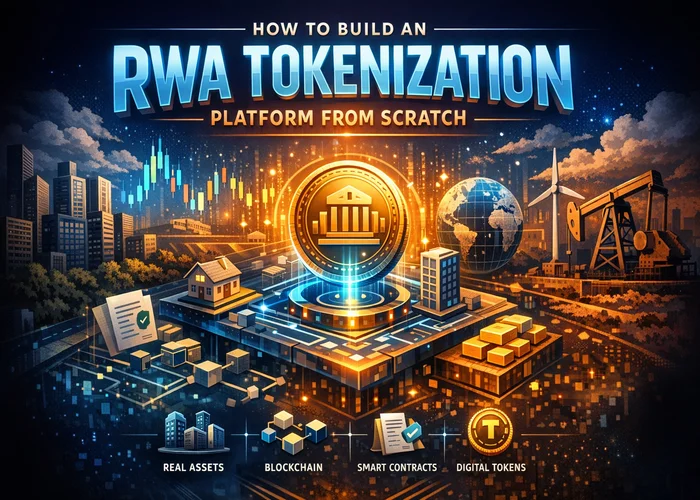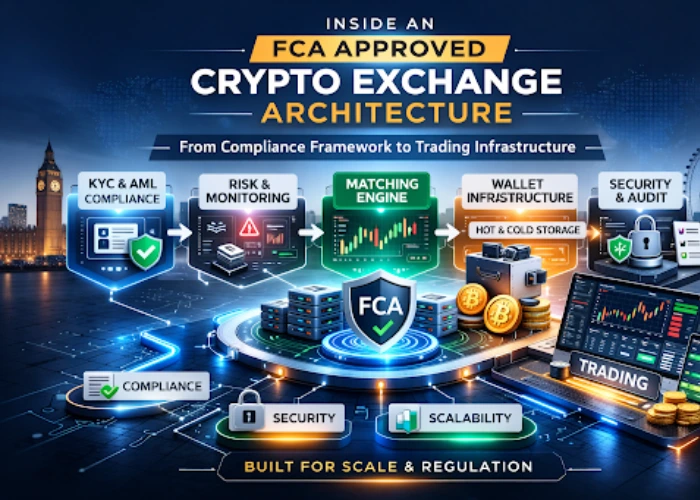Decentralized Exchanges (DEXs) are revolutionizing the cryptocurrency market by enabling peer-to-peer transactions without intermediaries. Unlike centralized exchanges, DEXs prioritize security, transparency, and user control. If you want to create a decentralized exchange, understanding its core principles is crucial. As a Cryptocurrency Exchange Development Company, we specialize in building robust platforms that align with emerging trends.
The Top 8 Centralized Crypto Exchange Development Trends highlight the shift toward decentralization due to increasing concerns about security breaches and lack of transparency. This emphasizes The Importance of Security in Cryptocurrency Exchanges and drives businesses to create instant cryptocurrency exchanges. A secure DEX ensures user funds remain protected while fostering trust among traders.
For startups, learning How to Create a Decentralized Cryptocurrency Exchange is critical to entering this competitive market. With the right team, you can integrate features like secure trading, wallet integration, and scalability. Many companies aim to create a crypto wallet alongside their DEX for a seamless user experience.
When you hire blockchain developers, ensure they focus on building scalable solutions. As one of the Top 10 Crypto Exchange Development Companies in 2025, we understand the need to deliver optimized, user-friendly platforms. Whether you’re looking for the Best White Label Crypto Wallet Development or exploring How to Open a Crypto Exchange Platform in 5 Simple Steps, DEXs offer unmatched potential.
By investing in how to build a scalable cryptocurrency exchange platform, businesses can gain a competitive edge. As the Best Cryptocurrency Exchange Development Company for Startups, we empower clients to create decentralized, secure, and innovative trading ecosystems.
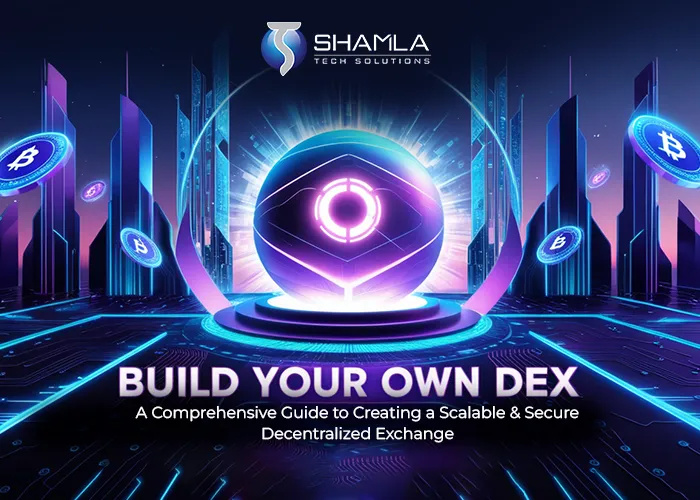
Why Build a Decentralized Exchange?
Decentralized Exchanges (DEXs) are rapidly transforming the way cryptocurrencies are traded, offering a secure, transparent, and user-driven alternative to traditional platforms. If you want to create a decentralized exchange, you’re tapping into the future of crypto trading. Unlike centralized platforms, DEXs eliminate intermediaries, enhancing user privacy and control over assets.
A leading cryptocurrency exchange development company understands the importance of security in cryptocurrency exchanges, which remains a significant driving force behind the rise of DEXs. By prioritizing security and decentralization, businesses can create instant cryptocurrency exchanges that cater to a growing demand for trustless systems.
Emerging trends, such as the Top 8 Centralized Crypto Exchange Development Trends, highlight a shift toward decentralization due to risks like hacks and data breaches. To stay competitive, businesses must hire blockchain developers to design scalable, user-friendly platforms. When you create a decentralized exchange, you provide users with more secure alternatives to store and trade assets.
Additionally, combining DEXs with wallet solutions allows you to create a crypto wallet for seamless transactions. Learning how to create a decentralized cryptocurrency exchange is a key step for startups aiming to disrupt the market. From the best white label crypto wallet development to understanding how to open a crypto exchange platform in 5 simple steps, building a DEX ensures scalability and innovation.
By investing in how to build a scalable cryptocurrency exchange platform, businesses secure their place in the competitive landscape. As the best crypto exchange development company for startups, creating decentralized solutions is a game-changer for the future of finance.
Understanding Key Features of a Decentralized Exchange
Decentralized Exchanges (DEXs) are transforming crypto trading by offering peer-to-peer transactions without intermediaries. If you plan to create a decentralized exchange, understanding its key features is essential.
One of the primary aspects is security. The importance of security in cryptocurrency exchanges cannot be overstated, as DEXs eliminate the risk of centralized breaches, giving users complete control over their assets. Businesses looking to create instant cryptocurrency exchanges must prioritize robust blockchain protocols to ensure trustless transactions.
A reliable cryptocurrency exchange development company plays a crucial role in building user-friendly DEXs with features like secure wallets. Integrating options to create a crypto wallet enhances usability, enabling users to trade seamlessly. Additionally, when you create a decentralized exchange, it’s essential to focus on liquidity pools, cross-chain compatibility, and user privacy.
The top 8 centralized crypto exchange development trends highlight the rising popularity of DEXs as users seek alternatives to centralized systems. Learning how to create a decentralized cryptocurrency exchange allows businesses to address these trends effectively.
To stay competitive, businesses should hire blockchain developers to integrate scalable solutions. From best white label crypto wallet development to understanding how to build a scalable crypto exchange platform, innovation is key.
For startups, the best cryptocurrency exchange development company for startups can guide you through how to open a crypto exchange platform in 5 simple steps. By focusing on these features, you can create a decentralized exchange that leads the future of secure and decentralized trading.
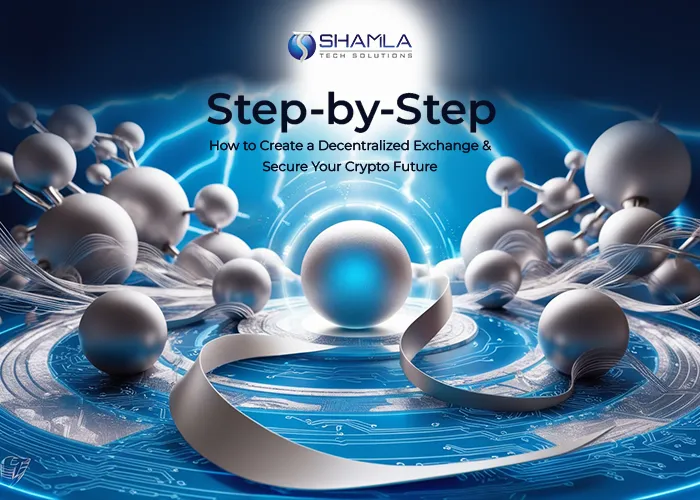
Types of Decentralized Exchanges
When businesses decide to create a decentralized exchange, understanding the different types of DEXs is crucial for successful implementation. Broadly, decentralized exchanges can be classified into three types: Automated Market Makers (AMMs), Order Book DEXs, and Hybrid DEXs.
Automated Market Makers (AMMs): These exchanges use smart contracts to set liquidity pools. Users can trade assets directly from the pool, which is managed by algorithms. The key benefit is that there is no need for an order book, and anyone can participate in liquidity provision. If you create a decentralized exchange using AMMs, you enable users to trade seamlessly without relying on a centralized authority.
Order Book DEXs: These exchanges resemble traditional centralized exchanges, as they match buy and sell orders directly. However, they still operate on a decentralized network. A crypto exchange development services can assist in building this model, ensuring features like low latency and robust order matching.
Hybrid DEXs: Combining the best features of AMMs and order book models, hybrid DEXs provide flexibility for users. They offer high liquidity and control over order matching, while still benefiting from decentralization.
When you create a decentralized exchange, focusing on the appropriate type ensures it meets user needs and industry trends. For startups, it’s important to hire blockchain developers who are skilled in creating scalable and secure solutions. Additionally, how to create a decentralized cryptocurrency exchange involves integrating key components such as secure wallets, smart contract protocols, and liquidity management tools.
The best white label crypto wallet development and understanding how to build a scalable cryptocurrency exchange platform are also critical steps for long-term success.
Choosing the Right Blockchain for Your DEX
When deciding to create a decentralized exchange, choosing the right blockchain is crucial to ensuring scalability, security, and speed. The blockchain you select determines transaction costs, speeds, and overall platform performance. A cryptocurrency exchange development services can guide you through this decision, taking into account factors such as scalability, security, and community support.
Ethereum: As the most popular blockchain for DEXs, Ethereum offers robust smart contract functionality. However, its high gas fees can be a concern for users. Despite this, many DEXs like Uniswap and Sushiswap are based on Ethereum’s ecosystem. If you plan to create a decentralized exchange with solid smart contract support, Ethereum is a top choice, though alternatives are becoming more appealing.
Binance Smart Chain (BSC): Known for its lower transaction fees and fast processing speeds, BSC is another great choice for DEXs. BSC enables the creation of instant cryptocurrency exchanges with low-cost transactions, which is crucial for user adoption.
Polygon (MATIC): For projects looking to scale without compromising decentralization, Polygon offers an efficient, low-cost solution. Polygon is perfect for projects aiming to create a decentralized exchange with quick transactions and low fees.
When considering how to create a decentralized cryptocurrency exchange, it’s essential to hire blockchain developers experienced in different blockchain ecosystems. They will ensure that your platform can handle high volumes of trades securely and efficiently.
In addition, integrating the best white label crypto wallet development into your DEX platform adds security, allowing users to store their assets safely while enjoying a seamless trading experience. This is one of the many important steps to build a scalable cryptocurrency exchange platform and ensure long-term success.
Essential Components of a Decentralized Exchange
When you decide to create a decentralized exchange, several key components must be considered to ensure the platform’s functionality, security, and efficiency. A crypto exchange development company plays a vital role in assisting you with integrating these crucial elements.
Smart Contracts: Smart contracts are essential for automating trades and ensuring that transactions are executed without any intermediary. They are the backbone of any decentralized exchange. When you create a decentralized exchange, smart contracts help execute trades based on predefined conditions, ensuring trustless and seamless transactions.
Liquidity Pools: Liquidity is vital for any exchange, and decentralized exchanges rely on liquidity pools to ensure users can trade at competitive prices. Users contribute to these pools, and in return, they earn a share of the transaction fees.
User Interface (UI): The user interface must be intuitive to allow users to easily execute trades and manage their assets. A smooth and easy-to-navigate UI enhances user experience, especially when you create an instant cryptocurrency exchange.
Security Features: The importance of security in cryptocurrency exchanges cannot be overstated. DEXs must integrate features like two-factor authentication (2FA), end-to-end encryption, and multi-signature wallets to protect users’ funds and data.
Wallet Integration: To create a crypto wallet and integrate it with the exchange, it is essential for users to access and trade their assets securely. A best white-label crypto wallet development option helps streamline this process.
By collaborating with the right team, such as a centralized crypto exchange development company, you can ensure these essential components are implemented effectively, helping you build a scalable cryptocurrency exchange platform that meets both security and performance standards.
How to Create Smart Contracts for Your DEX?
When you create a decentralized exchange, smart contracts are essential for automating trades and ensuring trustless transactions between users. These self-executing contracts allow for seamless and secure exchanges without relying on intermediaries. Working with a cryptocurrency exchange development company ensures that these contracts are developed according to your platform’s specific needs.
Define Your Smart Contract’s Purpose: Start by understanding the functions you want the smart contract to perform. Whether it’s handling token swaps, managing liquidity pools, or executing trade orders, the purpose of your contract will dictate the structure and logic. It’s essential to create a decentralized cryptocurrency exchange that is efficient and reliable in handling transactions.
Choose the Right Blockchain: Smart contracts are written on specific blockchains like Ethereum, Binance Smart Chain, or Solana. Each has different characteristics and transaction fees. How to create a decentralized cryptocurrency exchange begins by choosing a blockchain with the right scalability and transaction speed.
Write the Code: With the help of blockchain developers, you can now start writing the code for your smart contract. Ensure the contract is written securely to avoid bugs and vulnerabilities. The importance of security in cryptocurrency exchanges cannot be overstated, so auditing the contract before deployment is critical.
Test and Deploy: Once written, thoroughly test the smart contract on test networks to ensure it functions correctly. Upon successful testing, deploy it to the main network and integrate it with your exchange platform to create an instant cryptocurrency exchange.
By working with experienced blockchain developers, you can ensure that your smart contracts are secure, efficient, and optimized to create a decentralized exchange that meets both security and scalability needs.
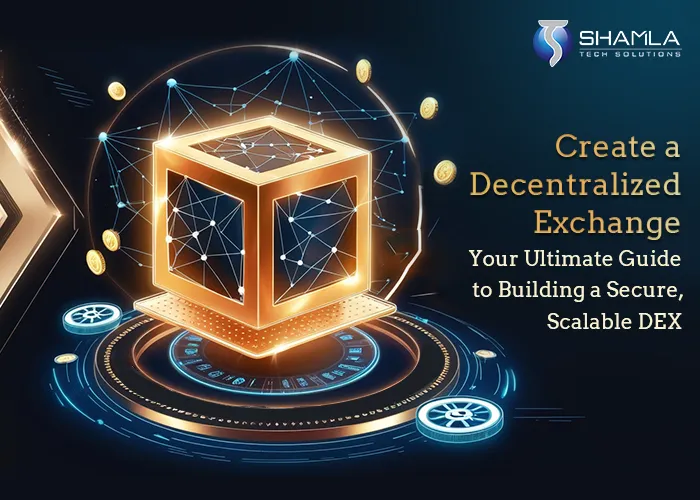
Implementing Liquidity Pools and Staking Mechanisms
These features not only improve liquidity but also incentivize active participation within the ecosystem.
Liquidity Pools: Liquidity pools are smart contracts that store a combination of assets, enabling users to trade without the need for centralized order books. By creating a decentralized exchange, you introduce liquidity pools where users deposit their tokens in return for liquidity provider (LP) tokens. This ensures that trades can be executed quickly and users receive a portion of the fees generated from transactions. A cryptocurrency exchange development company can assist in seamlessly implementing these pools.
Staking Mechanisms: Staking allows users to lock up their tokens for a certain period and earn rewards, often in the form of additional platform tokens. This mechanism not only helps secure the network but also promotes long-term engagement from users. When you create a decentralized cryptocurrency exchange, incorporating staking rewards can create a stable and loyal user base while enhancing the overall functionality of the platform.
Security Measures: As the importance of security in crypto exchanges is paramount, it’s crucial that liquidity pools and staking protocols are carefully audited. Ensuring these smart contracts are secure will protect users’ funds from malicious attacks or vulnerabilities. Working with trusted blockchain developers ensures that these elements are built with the necessary safeguards.
Collaborating with a crypto exchange development company can help you integrate these features into your platform while ensuring liquidity and security are always a priority. By focusing on liquidity pools and staking, you can create a decentralized exchange that offers users an optimized and secure trading environment.
Integrating Wallets and Payment Gateways for making DEX
- Create a Crypto Wallet: A secure wallet is the cornerstone of any DEX. By allowing users to create a crypto wallet within your platform, you empower them to store and manage their digital assets safely. Wallet integration must offer features such as private key management and multi-signature capabilities, which are crucial for the security of users’ funds. As a cryptocurrency exchange development company, we provide tailored solutions for integrating high-quality wallets that ensure user privacy and asset security.
- Payment Gateway Integration: To facilitate fiat-to-crypto or crypto-to-fiat transactions, integrating payment gateways is a vital step when you create a decentralized exchange. A well-designed payment gateway allows users to deposit and withdraw funds through traditional payment methods while maintaining the decentralized nature of the exchange. This integration enhances the user experience, making it easier to convert crypto assets into real-world currencies.
- Security Considerations: The importance of security in cryptocurrency exchanges cannot be overstated. Proper wallet and payment gateway integration requires strong security measures to prevent hacking and fraud. Working with expert blockchain developers ensures that your platform is equipped with the latest security protocols, protecting both user funds and data.

How to Ensure Security in Decentralized Exchanges?
When you create a decentralized exchange (DEX), ensuring top-notch security is paramount. A secure exchange fosters trust among users, protects funds, and prevents hacks or fraud. Here’s how to ensure security in your DEX:
Strong Wallet Integration: Create a crypto wallet with robust encryption to secure users’ private keys and transaction data. Ensuring wallet integration that supports features like multi-signature authentication and hardware wallets can drastically reduce the risk of unauthorized access. Working with a cryptocurrency exchange development company helps integrate the latest security practices into your wallet systems.
Smart Contract Audits: Since DEXs rely heavily on smart contracts, ensuring they are secure is critical. Regular audits conducted by experienced blockchain developers can identify and eliminate vulnerabilities in the code. This minimizes the risk of exploits, such as reentrancy attacks or logic flaws, that can result in significant financial losses.
Decentralized Governance: When you create a decentralized exchange, decentralizing the governance process can also enhance security. This method ensures that decisions about the platform’s updates and improvements are not controlled by a single entity, reducing the chance of malicious interference.
User Education: Inform your users about securing their accounts, such as by using strong passwords, enabling two-factor authentication, and keeping private keys safe. In the face of constant threats, educating users is as crucial as building secure infrastructure.
By working with the best cryptocurrency exchange development company for startups, you can create a decentralized cryptocurrency exchange with cutting-edge security measures and offer users a safe, transparent trading environment.
Compliance and Legal Considerations for DEX exchange
Due to the decentralized nature of DEXs, there are certain legal complexities that must be navigated carefully to ensure your platform operates within legal boundaries.
Regulatory Compliance: Unlike centralized exchanges, DEXs may not fall under the same direct regulatory requirements. However, it’s essential to stay updated on cryptocurrency regulations in the jurisdictions where your users are based. Ensuring compliance with Anti-Money Laundering (AML) and Know Your Customer (KYC) regulations is important, even for decentralized exchanges, to avoid regulatory issues.
Token Listings and Securities Laws: When you create a decentralized exchange, the issue of listing tokens becomes important. Some tokens may be classified as securities in certain countries, which could subject them to additional regulations. Collaborating with legal experts will help you determine which tokens are legally safe to list and avoid potential legal challenges.
Data Protection: In many regions, data protection laws, such as GDPR in Europe, require platforms to safeguard user data. Even though DEXs are decentralized, ensuring that your platform provides adequate data privacy and security is a critical consideration.
Legal Structure of the DEX: Establishing a legal structure for your decentralized cryptocurrency exchange is important for protecting yourself and your users. You may need to consult with a cryptocurrency exchange development company to navigate jurisdictional complexities and structure your business appropriately.
By partnering with the best cryptocurrency exchange development company for startups, you can ensure your DEX remains compliant while offering a secure and legal trading platform.
How to Market Your Decentralized Exchange?
Marketing a decentralized exchange (DEX) requires a unique approach due to its distinct features and the growing competition in the crypto space. When you create a decentralized exchange, it’s important to communicate its benefits and set it apart from centralized exchanges effectively.
Emphasize Security and Privacy: One of the major selling points of DEXs is the enhanced security and privacy they offer. When you create a decentralized exchange, highlight how users retain control of their funds and data, and the absence of a central authority that could compromise security. Focus on features like non-custodial wallets and peer-to-peer transactions.
Target the Right Audience: Understand your audience and target crypto enthusiasts, traders, and investors who prioritize control and transparency. Promote the platform to those who value decentralization and autonomy. Use platforms like Twitter, Reddit, and Telegram, which are popular among the crypto community.
Leverage Influencers and Partnerships: Collaborating with crypto influencers can significantly boost your marketing efforts. Reach out to blockchain advocates and thought leaders who can spread the word about your platform. Building partnerships with other blockchain projects can also help attract users who are already familiar with the ecosystem.
Educate Your Users: Since decentralized exchanges can be complex, providing educational content about how to create a decentralized exchange, how it works, and its advantages can build trust and user loyalty. Create blogs, webinars, and tutorials to simplify the onboarding process for new users.
By adopting these strategies, you can effectively market your DEX and ensure its success in a competitive crypto market.
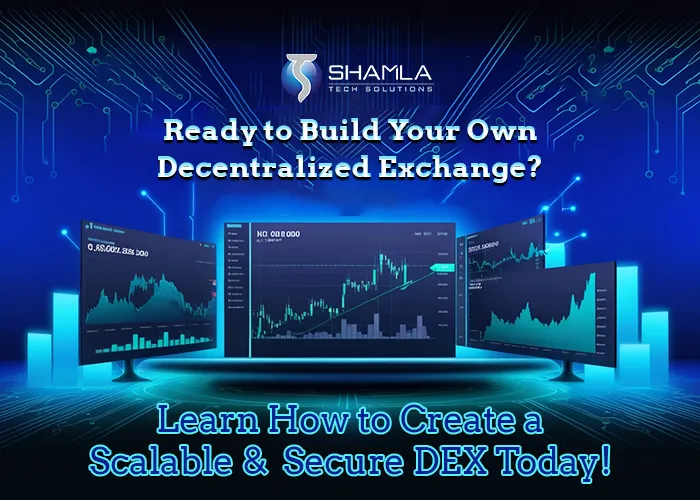
How Shamlatech is Best in Creating a Decentralized Exchange?
Shamlatech stands out as a leading provider when it comes to creating a decentralized exchange (DEX) that is secure, scalable, and user-friendly. With years of experience in blockchain technology and a deep understanding of the crypto ecosystem, Shamlatech ensures that every project is tailored to meet the unique needs of clients looking to create a decentralized exchange platform.
What sets Shamlatech apart is its expert team of blockchain developers who specialize in building robust, secure, and decentralized trading platforms. When you create a decentralized exchange with Shamlatech, you benefit from a highly efficient, non-custodial solution that enhances user control over assets and eliminates the risks associated with centralized platforms.
Shamlatech integrates top-tier security features such as end-to-end encryption, multi-signature wallets, and decentralized identity management to ensure that your DEX platform is protected against hacks and fraud. Their team is skilled in creating instant cryptocurrency exchanges that provide seamless trading experiences for users worldwide. Shamlatech also prioritizes transparency, ensuring that all transactions on the platform are visible to users in real-time, which builds trust and credibility.
In addition to their technical expertise, Shamlatech’s commitment to innovation ensures that your DEX will stay ahead of the curve, supporting the latest advancements in blockchain technology. Whether you’re looking to create a decentralized exchange for the first time or enhance an existing platform, Shamlatech is the ideal partner to help you achieve your goals efficiently and securely.
Conclusion
In conclusion, creating a decentralized exchange (DEX) is an ambitious yet highly rewarding venture that can redefine the way users trade and manage cryptocurrencies. By leveraging blockchain technology, DEX platforms offer enhanced security, transparency, and user control over assets, eliminating the risks and limitations associated with centralized exchanges. As the world of decentralized finance (DeFi) continues to grow, it’s crucial for businesses and entrepreneurs to partner with experienced developers who understand the complexities of DEX platforms.
Shamlatech stands out as a trusted leader in this space, providing end-to-end solutions to create a decentralized exchange that meets the specific needs of businesses and users alike. With a team of skilled blockchain developers, Shamlatech ensures that your DEX is not only secure but also scalable, efficient, and capable of handling the demands of a rapidly evolving market. Their expertise extends beyond just technical know-how, as they prioritize security with features such as multi-signature wallets, decentralized identity management, and end-to-end encryption.
Furthermore, Shamlatech understands the importance of staying ahead of trends in the blockchain and cryptocurrency sectors. Their approach integrates the latest innovations and adheres to the best practices in creating a decentralized exchange, ensuring that the platform is built to last and grow with future market changes. Whether you’re looking to build a completely new platform or improve an existing exchange, Shamlatech provides comprehensive support through each stage of the development process.
With a deep commitment to security, transparency, and innovation, Shamlatech is the perfect partner to help you create a decentralized exchange that not only meets industry standards but also delivers a seamless, trustworthy trading experience to users across the globe.
FAQs
- What is a Decentralized Exchange (DEX)?
A decentralized exchange (DEX) is a platform that allows users to trade cryptocurrencies directly with each other, without relying on a central authority. Unlike centralized exchanges, DEXs are powered by smart contracts and blockchain technology, ensuring higher security, transparency, and control for users.
- How Does a Decentralized Exchange Work?
A decentralized exchange operates by utilizing blockchain technology and smart contracts to execute trades directly between users. Liquidity is provided through various liquidity pools or individual orders placed by traders, and transactions are executed automatically through smart contracts.
- How Can I Create a Decentralized Exchange?
To create a decentralized exchange, you need a clear understanding of blockchain technology, smart contracts, and security protocols. You can hire a blockchain development company to build and deploy the platform according to your requirements, integrating features such as liquidity pools, token swaps, and secure wallet management.
- What Are the Advantages of a Decentralized Exchange?
The main advantages of DEXs include enhanced security, as users retain control of their assets, lower risks of hacks compared to centralized platforms, reduced fees, and the ability to trade any time without depending on third-party authorization.
- Is it Safe to Trade on a Decentralized Exchange?
Yes, trading on a DEX is generally safer than centralized exchanges, as users maintain control of their private keys and assets. However, security depends on the platform’s smart contracts, wallet integration, and proper encryption. It’s essential to choose a reputable blockchain development company for secure development.
- Can I Create a Crypto Wallet for a Decentralized Exchange?
Yes, you can create a crypto wallet that is compatible with your decentralized exchange. Wallets integrated with DEXs typically support decentralized control and facilitate secure transactions. You can also create a white-label wallet with added features for enhanced user experience.
- How Do Liquidity Pools Work in DEXs?
Liquidity pools in DEXs allow users to lock their crypto assets into smart contracts, which are then used to facilitate trading on the exchange. In return, liquidity providers earn a share of the transaction fees. These pools ensure that the exchange remains liquid and can handle buy/sell orders effectively.
- What Are the Key Features of a Decentralized Exchange?
Key features of a DEX include peer-to-peer trading, decentralized custody of funds, low fees, automated market-making, token swaps, and the ability to integrate multiple cryptocurrencies. Ensuring security through encryption and decentralized governance is also critical.
- How Can I Ensure Security in My Decentralized Exchange?
To ensure security in your decentralized exchange, implement secure smart contract coding, integrate multi-signature wallets, conduct regular audits, and use encryption protocols. Additionally, ensure that the platform supports two-factor authentication (2FA) and has secure decentralized identity management features.
- What Are the Costs Involved in Creating a Decentralized Exchange?
The costs of creating a decentralized exchange vary depending on the platform’s complexity, features, and blockchain used. These costs include development, security audits, integration of payment gateways, smart contract development, and continuous maintenance. It’s best to consult with a reputable cryptocurrency exchange development company to get an accurate estimate.






